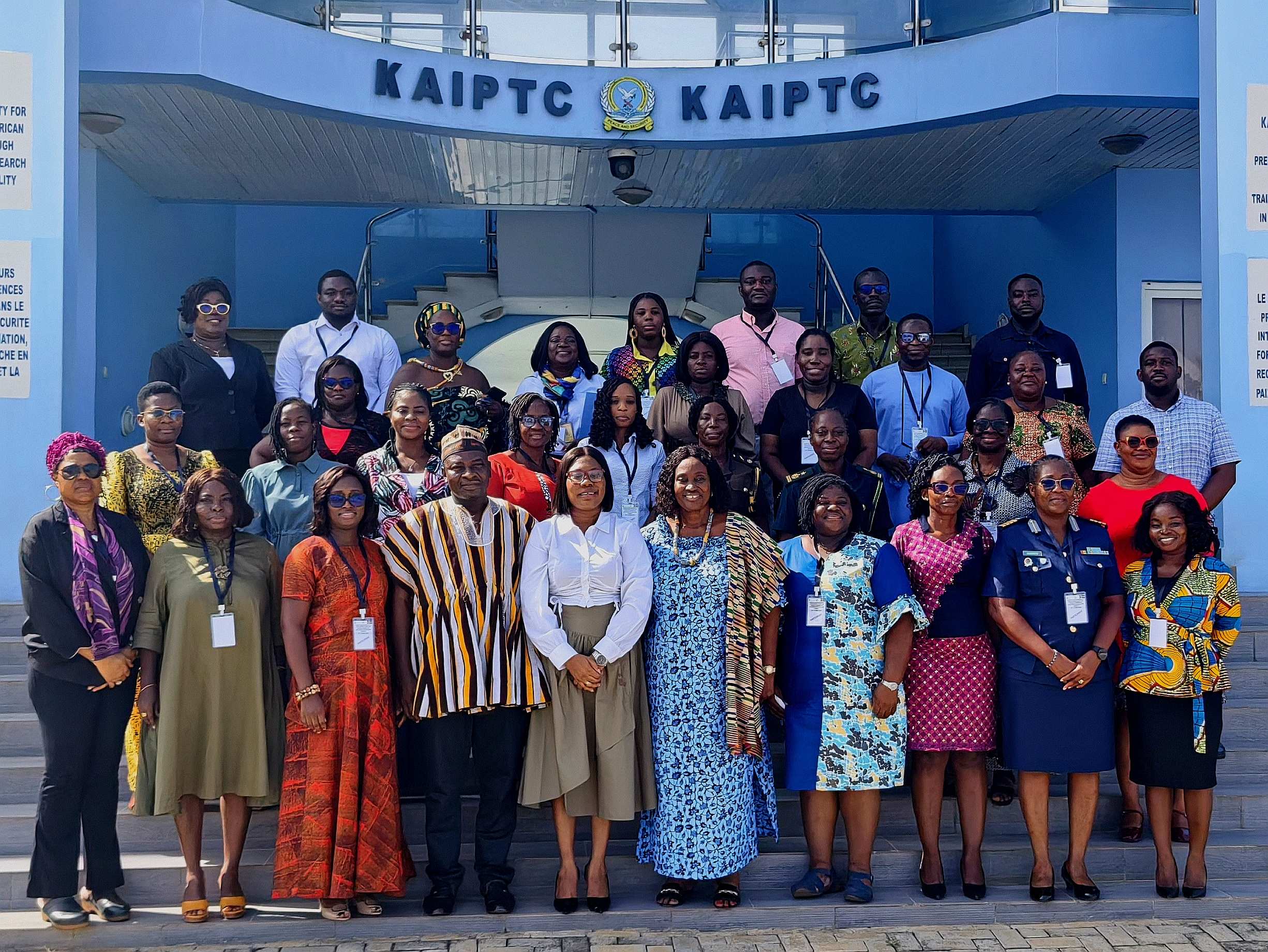A three-day Technical Working Group workshop has been held, to review the implementation of the Second Ghana National Action Plan (GHANAP II) on the United Nations Security Council Resolution (UNSCR) 1325, and to craft GHANAP III which is evidence-based, context-specific, and resilient in addressing both current and emerging threats.
The opening ceremony for the workshop was held at the Multi-Purpose Training Facility (MPTF) of the Kofi Annan International Peacekeeping Training Centre (KAIPTC), Accra, on Tuesday 6 May 2025, as the workshop also avails to the general public results delivered so far, and challenges being encountered.

Ghana, since the coming into being of the UNSCR 1325, has committed to the development and implementation of National Action Plans, which serve as critical instruments for advancing the inclusion, protection, and empowerment of women in all areas of peacebuilding and national security.
Delivering an overview of national activities so far on the National Action Plan on Women, Peace and Security, and on the strategic priorities for the formulation and implementation of the Third National Action Plan, the Director, Ministry of Gender, Children and Social Protection – Madam Vera Karikari Bediako, spoke to the following;
UNSCR 1325 is the first formal legal document by the global Security Council that addresses the plight of women and girls in conflict situations, and provides a political framework with operational mandates that hold implications for governments, policy makers, decision makers, program implementers, and funding partners.

The document calls for special measures to protect women and girls from gender-based violence (GBV), particularly rape and other forms of sexual abuse in situations of armed conflict, urging respect for the rights of women and girls in conflict and post-conflict settings.
The resolution, aiming to end impunity – by persecuting perpetrators of violence against women and girls – promotes increased participation of women through the inclusion of gender perspectives in conflict resolution, peace-seeking and peace-building.
Although Ghana is recognized globally as a peaceful country, it has experienced pockets of recurrent conflicts leading to violent clashes which are often rooted in chieftaincy disputes, ethnic tensions, land issues, and political rivalries, alongside crimes such as armed robbery, which have negatively impacted the peace and security of women.

The country’s Ministry of Gender, Children and Social Protection was mandated among others, to ensure that women in development processes spearheaded the development of Ghana’s first national action plan, termed Ghana 1325, in 2012, which was later reviewed in 2017, resulting in the development of GHANAP II from 2020 to 2025.
In addition to GHANAP II, the Ministry has developed several national frameworks, legislations and policies aimed at protecting the peace and security of women in Ghana, key among which is the Affirmative Action Gender Equity Act 2024 Act 1121, which promotes gender equity in various institutions, with particular focus on the security services, and also provides for various strategies in achieving the mandate of UN Resolution 1325.
GHANAP II presented a structured approach to strengthening institutional frameworks, increasing women’s participation, and safeguarding the rights and dignity of women and girls in conflict and post-conflict contexts.
In 2021, the Ministry set up a technical working group to bring together key stakeholders responsible for implementing GHANAP II, to strategize for effective implementation and institutional monitoring of the plan.

Capacities of technical working group members were built on the African Union (AU) continental resource framework, to enable Ghana effectively meet its reporting obligations to the AU.
The Ministry, with support from the United Nations Population Fund (UNFPU) established the Orange Support Centre, which has three-call centers operating 24-hours, counselling, legal and medical support Units to provide support services for survivors of sexual and gender based violence, and to assist survivors of sexual and gender-based violence.
The Ministry has also established Market Response Centres in 10 markets nationwide, to provide referral and paralegal services on sexual and gender-based violence, and in addition, commenced the Dry Scale Emergency Cash Transfer Initiative, to support vulnerable households in eight Administrative Regions affected by the recent dry scale.
The initiative provides a one-time cash transfer of GHS1000 to lead beneficiaries, aimed at helping them meet immediate needs like food, water and healthcare.
Madam Dorothy Barnes, speaking for Foundation for Security and Development in Africa (FOSDA), said her organization is undertaking an independent monitoring on the GHANAP II, and are also in the Phase II of their monitoring endeavour.

She stated that in the Phase I of their monitoring which commenced from April to December 2023, they engaged six institutions, which included the Ministry of Gender, Children and Social Protection, the National Peace Council, some security services, and others, and noted that the country had reached about a 20.84% of implementation.
Participating institutions included various Government Ministries such as Foreign Affairs and Regional Integration, Education, Local Government, Chieftaincy and Religious Affairs, Gender, Children and Social Protection, Parliamentary Affairs, and Defence.
Other agencies were Ghana Armed Forces, Domestic Violence and Victim Support Unit (DOVVSU) of the Ghana Police Service, Ghana Immigration Service, National Disaster Management Organization (NADMO), Department of Gender, National Centre for Coordination of Early Warning and Response Mechanism (NCCRM).
The rest were; West Africa Network for Peacebuilding (WANEP), Gender Centre for Empowering Development (GENCED), Association of Queen Mothers, Women’s International League for Peace and Freedom (WILPF), LOVEAID Foundation, Women In Law and Development in Africa (WILDAF), Institute of Local Government Studies, KAIPTC, and FOSDA.

GHANAP II expires at the close of 2025, as UNSCR 1325 marks its Silver Jubilee anniversary of women’s participation in peace and security.
By Kofi Ampeah-Woode
